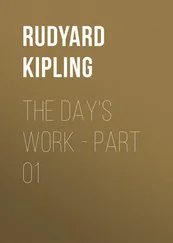Джозеф Киплинг - The Day's Work - Volume 1
Здесь есть возможность читать онлайн «Джозеф Киплинг - The Day's Work - Volume 1» весь текст электронной книги совершенно бесплатно (целиком полную версию без сокращений). В некоторых случаях можно слушать аудио, скачать через торрент в формате fb2 и присутствует краткое содержание. Год выпуска: 2014, Издательство: epubBooks Classics, Жанр: Прочие приключения, на английском языке. Описание произведения, (предисловие) а так же отзывы посетителей доступны на портале библиотеки ЛибКат.
- Название:The Day's Work - Volume 1
- Автор:
- Издательство:epubBooks Classics
- Жанр:
- Год:2014
- ISBN:нет данных
- Рейтинг книги:3 / 5. Голосов: 1
-
Избранное:Добавить в избранное
- Отзывы:
-
Ваша оценка:
- 60
- 1
- 2
- 3
- 4
- 5
The Day's Work - Volume 1: краткое содержание, описание и аннотация
Предлагаем к чтению аннотацию, описание, краткое содержание или предисловие (зависит от того, что написал сам автор книги «The Day's Work - Volume 1»). Если вы не нашли необходимую информацию о книге — напишите в комментариях, мы постараемся отыскать её.
The Day's Work - Volume 1 — читать онлайн бесплатно полную книгу (весь текст) целиком
Ниже представлен текст книги, разбитый по страницам. Система сохранения места последней прочитанной страницы, позволяет с удобством читать онлайн бесплатно книгу «The Day's Work - Volume 1», без необходимости каждый раз заново искать на чём Вы остановились. Поставьте закладку, и сможете в любой момент перейти на страницу, на которой закончили чтение.
Интервал:
Закладка:
A female servant came in and waited; though Mrs. McPhee had told me time and again that she would thank no one to do her housework while she had her health. But this was a servant with a cap, and I saw Mrs. McPhee swell and swell under her garance–coloured gown. There is no small free–board to Janet McPhee, nor is garance any subdued tint; and with all this unexplained pride and glory in the air I felt like watching fireworks without knowing the festival. When the maid had removed the cloth she brought a pineapple that would have cost half a guinea at that season (only McPhee has his own way of getting such things), and a Canton china bowl of dried lichis, and a glass plate of preserved ginger, and a small jar of sacred and Imperial chow–chow that perfumed the room. McPhee gets it from a Dutchman in Java, and I think he doctors it with liqueurs. But the crown of the feast was some Madeira of the kind you can only come by if you know the wine and the man. A little maize–wrapped fig of clotted Madeira cigars went with the wine, and the rest was a pale blue smoky silence; Janet, in her splendour, smiling on us two, and patting McPhee's hand.
"We'll drink," said McPhee, slowly, rubbing his chin, "to the eternal damnation o' Holdock, Steiner & Chase."
Of course I answered "Amen," though I had made seven pound ten shillings out of the firm. McPhee's enemies were mine, and I was drinking his Madeira.
"Ye've heard nothing?" said Janet. "Not a word, not a whisper?"
"Not a word, nor a whisper. On my word, I have not."
"Tell him, Mac," said she; and that is another proof of Janet's goodness and wifely love. A smaller woman would have babbled first, but Janet is five feet nine in her stockings.
"We're rich," said McPhee. I shook hands all round.
"We're damned rich," he added. I shook hands all round a second time.
"I'll go to sea no more—unless—there's no sayin'—a private yacht, maybe—wi' a small an' handy auxiliary."
"It's not enough for that," said Janet. "We're fair rich—well–to–do, but no more. A new gown for church, and one for the theatre. We'll have it made west."
"How much is it?" I asked.
"Twenty–five thousand pounds." I drew a long breath. "An' I've been earnin' twenty–five an' twenty pound a month!"
The last words came away with a roar, as though the wide world was conspiring to beat him down.
"All this time I'm waiting," I said. "I know nothing since last September. Was it left you?"
They laughed aloud together. "It was left," said McPhee, choking. "Ou, ay, it was left. That's vara good. Of course it was left. Janet, d' ye note that? It was left. Now if you'd put that in your pamphlet it would have been vara jocose. It was left." He slapped his thigh and roared till the wine quivered in the decanter.
The Scotch are a great people, but they are apt to hang over a joke too long, particularly when no one can see the point but themselves.
"When I rewrite my pamphlet I'll put it in, McPhee. Only I must know something more first."
McPhee thought for the length of half a cigar, while Janet caught my eye and led it round the room to one new thing after another—the new vine–pattern carpet, the new chiming rustic clock between the models of the Colombo outrigger–boats, the new inlaid sideboard with a purple cut–glass flower–stand, the fender of gilt and brass, and last, the new black–and–gold piano.
"In October o' last year the Board sacked me," began McPhee. "In October o' last year the Breslau came in for winter overhaul. She'd been runnin' eight months—two hunder an' forty days—an' I was three days makin' up my indents, when she went to dry–dock. All told, mark you, it was this side o' three hunder pound—to be preceese, two hunder an' eighty–six pound four shillings. There's not another man could ha' nursed the Breslau for eight months to that tune. Never again—never again! They may send their boats to the bottom, for aught I care."
"There's no need," said Janet, softly. "We're done wi' Holdock, Steiner & Chase."
"It's irritatin', Janet, it's just irritatin'. I ha' been justified from first to last, as the world knows, but—but I canna forgie 'em. Ay, wisdom is justified o' her children; an' any other man than me wad ha' made the indent eight hunder. Hay was our skipper—ye'll have met him. They shifted him to the Torgau, an' bade me wait for the Breslau under young Bannister. Ye'll obsairve there'd been a new election on the Board. I heard the shares were sellin' hither an' yon, an' the major part of the Board was new to me. The old Board would ne'er ha' done it. They trusted me. But the new Board were all for reorganisation. Young Steiner—Steiner's son—the Jew, was at the bottom of it, an' they did not think it worth their while to send me word. The first I knew—an' I was Chief Engineer—was the notice of the line's winter sailin's, and the Breslau timed for sixteen days between port an' port! Sixteen days, man! She's a good boat, but eighteen is her summer time, mark you. Sixteen was sheer flytin', kitin' nonsense, an' so I told young Bannister.
"We've got to make it,' he said. 'Ye should not ha' sent in a three hunder pound indent.'
"Do they look for their boats to be run on air?' I said. 'The Board's daft.'
"'E'en tell 'em so,' he says. 'I'm a married man, an' my fourth's on the ways now, she says.'"
"A boy—wi' red hair," Janet put in. Her own hair is the splendid red–gold that goes with a creamy complexion.
"My word, I was an angry man that day! Forbye I was fond o' the old Breslau, I looked for a little consideration from the Board after twenty years' service. There was Board–meetin' on Wednesday, an' I slept overnight in the engine–room, takin' figures to support my case. Well, I put it fair and square before them all. 'Gentlemen,' I said, 'I've run the Breslau eight seasons, an' I believe there's no fault to find wi' my wark. But if ye haud to this'—I waggled the advertisement at 'em—'this that I've never heard of it till I read it at breakfast, I do assure you on my professional reputation, she can never do it. That is to say, she can for a while, but at a risk no thinkin' man would run.'
"'What the deil d' ye suppose we pass your indents for?' says old Holdock. 'Man, we're spendin' money like watter.'
"'I'll leave it in the Board's hands,' I said, 'if two hunder an' eighty–seven pound is anything beyond right and reason for eight months.' I might ha' saved my breath, for the Board was new since the last election, an' there they sat, the damned deevidend–huntin' ship–chandlers, deaf as the adders o' Scripture.
"'We must keep faith wi' the public,' said young Steiner.
"'Keep faith wi' the Breslau, then,' I said. 'She's served you well, an' your father before you. She'll need her bottom restiffenin', an' new bed–plates, an' turnin' out the forward boilers, an' re–turnin' all three cylinders, an' refacin' all guides, to begin with. It's a three months' job.'
"'Because one employee is afraid? 'says young Steiner. 'Maybe a piano in the Chief Engineer's cabin would be more to the point.'
"I crushed my cap in my hands, an' thanked God we'd no bairns an' a bit put by.
"'Understand, gentlemen,' I said. 'If the Breslau is made a sixteen–day boat, ye'll find another engineer.'
"'Bannister makes no objection,' said Holdock.
"'I'm speakin' for myself,' I said. 'Bannister has bairns. 'An' then I lost my temper. 'Ye can run her into Hell an' out again if ye pay pilotage,' I said, 'but ye run without me.'
"'That's insolence,' said young Steiner.
"'At your pleasure,' I said, turnin' to go.
"'Ye can consider yourself dismissed. We must preserve discipline among our employees,' said old Holdock, an' he looked round to see that the Board was with him. They knew nothin'—God forgie 'em—an' they nodded me out o' the line after twenty years—after twenty years.
Читать дальшеИнтервал:
Закладка:
Похожие книги на «The Day's Work - Volume 1»
Представляем Вашему вниманию похожие книги на «The Day's Work - Volume 1» списком для выбора. Мы отобрали схожую по названию и смыслу литературу в надежде предоставить читателям больше вариантов отыскать новые, интересные, ещё непрочитанные произведения.
Обсуждение, отзывы о книге «The Day's Work - Volume 1» и просто собственные мнения читателей. Оставьте ваши комментарии, напишите, что Вы думаете о произведении, его смысле или главных героях. Укажите что конкретно понравилось, а что нет, и почему Вы так считаете.












